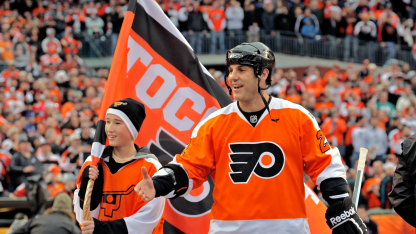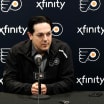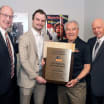On November 5, 2020, two-stint Flyers right winger and current Arizona Coyotes head coach Rick Tocchet was remotely inducted into the Philadelphia Sports Hall of Fame as part of its Class of 2000. Tocchet is the first Flyers-affiliated inductee in the Philadelphia Sports Hall of Fame who is not yet an inductee in the Flyers Hall of Fame.
MELTZER: The Case for Rick
Hall of Fame week continues with a look at Rick Tocchet

On Monday of this week, Tocchet was Jason Myrtetus' guest on Flyers Daily on the Flyers Broadcast Network. He discussed his years playing for the Flyers, as well as the experience of waiting out the start of 2020-21 training camp and the challenges involved for coaches as well as players.
One of the toughest power forwards of his era, hard work and determination enabled Tocchet to become a perennial overachiever in the National Hockey League in an 1,144-game career that included separate stints with the Flyers at the beginning (1984-85 to 1991-92) and end (1999-2000 to 2001-2002) of his playing career.
The Scarborough, Ontario native was originally a sixth-round pick (121st overall) in the 1983 NHL Draft. Little did the rugged Sault Ste. Marie Greyhounds winger suspect at the time that he'd make it to the NHL just one year later, bypassing the American Hockey League.
"I just remember as a kid, being 19 years old, and [legendary Flyers public relations director] Joe Kadlec taking me to the Spectrum for the first time, as a draft pick. I remember looking out at either side of the Walt Whitman Bridge at how big Philly was and it was like, 'Where am I?'' And that area, the people there, became like family to me. I grew up there," Tocchet recalled.
"I still have a lot of friends in the Phladelphia area. They really helped me. You know, when you're 19 years old and you're going to a big city, it can be overwhelming. Ed Snider had that family-like atmosphere, which really helped me a lot. I owe them a lot for getting me to the career I ultimately had."
Tocchet was not a natural-born star in the NHL, nor did success come overnight despite graduating to the world's top league at the tender age of 20. It was his intense competitiveness and work ethic was what turned him from a third-line caliber forward best known for his fighting prowess into one the NHL's top power forwards of the late 1980s to mid 1990s. He reached the Stanley Cup Final with the Flyers in 1985, 1987 (falling just one win short of hockey's ultimate prize) as well as the Wales Conference Final in 1989.
At the time, it was a whirlwind of activity and an emotional rollercoaster for everyone involved. Only years later has Tocchet gained full perspective on what an extraordinary era in was.
The Flyers were the youngest team in the NHL, with a ultra-intense rookie head coach in Mike Keenan, when Tocchet made his NHL debut in 1984-85. He forged close bonds with a host of teammates, especially the likes of the late Peter Zezel, Murray Craven and Derrick Smith. The team as a whole had to rally around each other following the tragic death of Vezina Trophy winning goalie Pelle Lindbergh in November 1985, and their shared grief over Lindbergh, as well as the two runs to the Cup Finals, left everyone spent emotionally.
"[Lindbergh's death] really hit me a day or two later. I remember right afterward that Mike Keenan had everyone over at his house, kind of like a group therapy talk about it. I think it was the second or third night, and it really hit me. I broke down. My teammates were unbelievable. Dave Poulin was our captain and he did an incredible job to keep our group together. That was a very tight-knit group," Tocchet recalled.
"I've gotta tell you. I played 18 years and had a lot of good memories, Stanley Cups and stuff, but that group was the closest I've ever been involved with. Just incredible people. And a hard-working group. We dealt with all of it together. We had strong leadership and a strong organization."
The 1987 run, backstopped by rookie goalie Ron Hextall, was the culmination of that era of Flyers hockey. Tocchet made a statement by his playoff performance -- 11 goals and 21 points -- that he'd arrived as a true impact player in the NHL. Ultimately, the injury-riddled Flyers dropped a hard-fought Game 7, 3-1, to the Edmonton Oilers at the height of their dynasty.
"I'll go golfing sometimes with Wayne Gretzky and Paul Coffey, who've become good friends of mine, and I'll tell them, 'We would have won Game 7 if Timmy Kerr was able to play.' He was a perennial 50-goal scorer, and he scored a power play goal almost every game. He would have scored in that game. They kind of laugh about it and bust on me a little. But there's no doubt how great that Edmonton team was," Tocchet said.
Although he didn't always understand or agree with Keenan's methods of coaching his personnel, Tocchet says in retrospect that the coach got the most out of the club. A host of Keenan's players, both in Philadelphia and in subsequent coaching stops, played the best hockey of their career during their time playing for "Iron Mike."
"The thing with Keenan is that I think, for that era, we were the best-conditioned team in the league. He put us to the grindstone, but we were in great shape and that's something I will always remember," Tocchet said.
The Flyers of the mid-to-late 1980s only had one player -- defenseman Mark Howe -- who ultimately earned a place in the "big" Hockey Hall of Fame in Toronto. There was plenty of talent and depth but not as much star power as the Oilers dynasty of the mid-1980s to 1990 or the New York Islanders dynasty of 1980 to 1983. During his Flyers years, Tocchet learned lessons that he late applied to coaching: chemistry, depth and work ethic are indispensable.
"I really believe you have to have four lines, and everyone has to fit in the puzzle. Sometimes you can have the best players, but it doesn't work. You have to have the best total puzzle. Our teams, everyone was a puzzle piece, and guys just accepted their role. That was the biggest key. Everybody wants more, and I understand that, but you've got to accept being a team player," Tocchet said.
Tocchet's own niche expanded over time. The term "power forward" first came in vogue leaguewide during Tocchet's heyday, referring to players who combined a tenacious physical style of play, a willingness to drop the gloves will all comers and goal-scoring prowess to top it off. Tocchet became one of the very best power forwards in the NHL, along with the likes of Cam Neely and Brendan Shanahan.
Tocchet achieved his first 20-goal season in his third NHL campaign. He just kept improving from there. "Tocch" scored 31 goals in 1987-88 and then, in 1988-89, attained his first of three 40-goal campaigns.
During the mid-to-late 1980s, Tocchet was one of the team's resident heartthrobs along with Peter Zezel. Tocchet was named Flyers captain on Oct. 2, 1991 and served in that capacity until he was traded to the Pittsburgh Penguins on Feb. 19, 1992 in a blockbuster trade that brought Mark Recchi to the Flyers. Tocchet went on to win the Stanley Cup with the Penguins that spring and achieved his lone 100-point season (48g, 61a) in 1992-93.
After spending parts of three seasons with the Penguins, Tocchet had stints with the LA Kings, Boston Bruins, Washington Capitals (briefly) and the Coyotes before he was reacquired by the Flyers.
Tocchet returned to the Flyers on March 8, 2000 in one-for-one trade with the Phoenix Coyotes that brought former Legion of Doom right wing Mikael Renberg's second Flyers stint to an end. Tocchet was a valuable addition down the stretch and the playoffs in 1999-2000. The hard-nosed veteran notched 11 points in 18 playoff games, as the team fell a 2-1 Game 7 loss to New Jersey short of a return trip to the Stanley Cup Final for the first time since 1997.
"That was another great group, when I came back to the Flyers. When I see those guys, we always talk about, 'Wow, just one inch here, one inch there.' You know, just little things. We had a team that was good enough to win. I think we could have beat Dallas [in the Stanley Cup Final]. There's a lot of what ifs. But I gotta tell you, that year, I had such a blast. I was an older guy, on the back-nine of my career, but it was a great time. Just seeing those guys, like Craig Berube, Keith Jones, Chris Therien, we had a very close team," Tocchet recalls.
"There was a lot of stuff going on, like with Eric Lindros getting hurt and wondering if he was going to come back or not, we dealt with a lot. Brian Boucher coming into his own. I mean, it was a real good game. Patrik Elias scoring late in the [seventh] game, kind of broke our hearts. But, you know, I look back at Game 5. We [came in leading three games to one but] just weren't ready to play. We came in, and we were kind of distracted and stuff. That was a game we just gave 'em. Then we lose it in seven."
For his two-stint Flyers career, Tocchet scored 232 goals (tied for 10th in franchise history) and 508 points in 621 regular season games. He is franchise's all-time time leader in penalty minutes (1,817). In 95 career playoff games, he produced 27 goals, 33 assists, 60 points and 349 penalty minutes. He is also the all-time franchise leader in Gordie Howe Hat Tricks (nine).


















